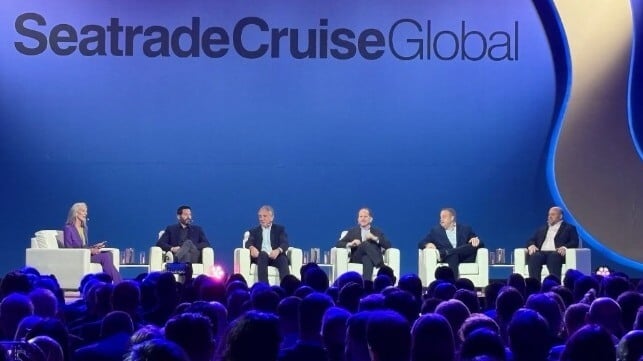Cruise Executives Highlight Resilience and Long-Term Strategy

The cruise industry enters 2025 in one of its strongest positions ever as the executives of the cruise lines discussed the near-term challenges looming for the economy and global instability. Speaking at the Opening General Season of the industry trade show Seatrade Cruise Global 2025 they highlighted the industry’s history of resilience and ability to adapt in the face of growing economic and political instability.
Asked about the current economic climate and how it was impacting the cruise industry, Josh Weinstein, President and CEO of Carnival Corporation, admitted that the industry’s much ballyhooed “wave season” this year was inconsistent and “choppy.” He said Carnival Corp., like most of the industry companies, started 2025 heavily booked with a long duration stretching out to cruises in 2026 and 2027, but consumers have quickly pulled back in the face of the emerging uncertainties.
“Bookings slowed,” said Weinstein as “people adjusted to the new conditions.” He however believes consumers adjust and the value proposition of cruising will put the industry in a better position. The executives avoided saying “recession,” but it is clearly on everyone’s mind. Weinstein admitted cruising “is not immune from a recession.”
Tariffs and the emerging trade war however they dismissed as having little impact on the cruise industry. The CEOs of Carnival Corp., MSC Cruises, Norwegian Cruise Line Holdings, and Royal Caribbean Group all pointed to the industry’s local supply chains and ability to adjust to avoid tariffs. Pierfrancesco Vago, Executive Chairman of MSC Cruises, also noted that they continue to see Americans traveling to Europe and Europeans booking travel to the United States.
The new President and CEO of CLIA (Cruise Lines International Association), Bud Darr who left MSC to run the trade group, highlighted that about a third of the world’s democracies held elections in 2024, acknowledging a global “mood change in policy.” He noted a cyclical nature of policy while saying cruising would be an “evolving industry in an evolving world.”
“We are not changing our strategy after two days,” said Harry Sommer, CEO of Norwegian Cruise Line Holdings, referencing the launch of Trump’s tariffs and the collapse in global stock markets.
The executives pointed to the continuing investments being announced for new ships. At least six cruise ship orders have been announced to coincide with the start of the conference.
“We have great confidence in the long-term and are managing for the long-term,” said Jason Liberty, President and CEO of Royal Caribbean Group. He noted the lack of building slots at the four European shipyards that build large cruise ships noting the companies were managing construction for the long term.
While CLIA calculates there are 60 cruise ships on order, it was noted that half are under 100,000 gross tons. They said however that cruise ships are getting larger in part to provide space for new and future technologies.
“We are not building bigger for the sake of bigger,” said Weinstein. He acknowledges the economics of new cruise ships but said they design ships to provide different experiences for people looking for different options. Vago agreed pointing to the ability of smaller cruise ships to go “off the beaten track.”

that matters most
Get the latest maritime news delivered to your inbox daily.
The executives each highlighted that they remained optimistic while there was also a call for more collaboration. They said the industry needs to continue to educate elected officials and others of its value and contribution as well as working with local authorities to address concerns before they become a problem.
The conversation with the executives kicked off the three-day trade show. Organizers noted that the conference is marking milestones, including its 40th anniversary with 12,000 attendees. CLIA highlighted its expectations that cruising will continue to grow releasing its projection that 37 million people will cruise in 2025 and better than 13 percent growth to reach 42 million passengers by 2028.
